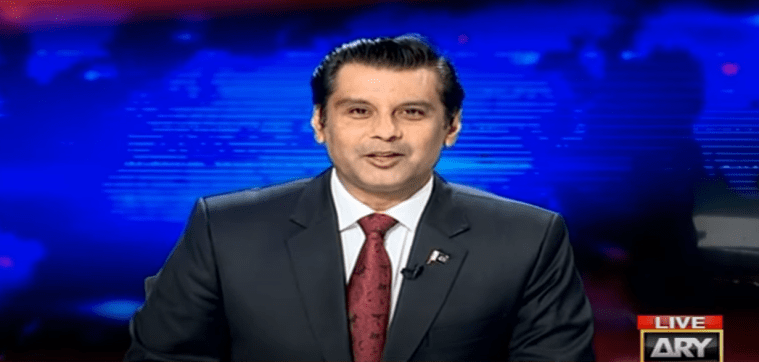New York, May 25, 2022– Pakistan authorities must immediately drop their investigations into journalists Sami Abraham, Arshad Sharif, Sabir Shakir, and Imran Riaz Khan, and refrain from arresting and targeting journalists in retaliation for their work, the Committee to Protect Journalists said Wednesday.
Since May 18, police across Pakistan have filed multiple first information reports (FIR), which open an investigation, against Abraham, an anchor with the privately owned broadcaster BOL News and the host of a popular current affairs YouTube channel, Khan, an anchor with the privately owned broadcaster Express News, and Sharif and Shakir, both anchors with the privately owned broadcaster ARY News, according to news reports and the journalists, who spoke with CPJ via phone and messaging app.
The spate of investigations come amid physical, legal, and online harassment of journalists following the parliament’s election of Prime Minister Shehbaz Sharif on April 11, after ousting former Prime Minister Imran Khan in a no-confidence vote. On May 4, Prime Minister Sharif tweeted that the new government was “fully committed to freedom of press & speech.”
The four journalists are known as supporters of former Prime Minister Khan, according to news reports.
Among other offenses, the multiple FIRs all accuse the four journalists violating sections of Pakistan’s penal code pertaining to abetment of mutiny and publication of statements causing public mischief by criticizing state institutions and the army in their journalistic work and unspecified social media posts. Abetment of mutiny can carry life imprisonment and an unspecified fine, and the public mischief accusation can carry a prison sentence of seven years and an unspecified fine, according to the law.
“Pakistan authorities’ launch of a blizzard of harassing criminal investigations into journalists seen as sympathetic to the former ruling party makes a mockery of its claims to uphold press freedom,” said Steven Butler, CPJ’s Asia program coordinator, in Washington, D.C. “Authorities should withdraw the investigations into Sami Abraham, Imran Riaz Khan, Arshad Sharif, and Sabir Shakir and ensure that members of the press do not face retaliation for their commentary on the military or any other institutions in Pakistan.”
In at least three of the FIRS – which were filed by police in Quetta, Pishin, and Chaman in southwest Balochistan province – Abraham, Sharif, and Shakir are co-accused of working together to malign state institutions through their journalistic work and commentary, according to those three journalists and copies of the FIRS which CPJ reviewed.
In at least one FIR– filed by police in Dadu in southeast Sindh province– Sharif and Shakir are accused of using derogatory language about the army and state institutions and drawing analogies to controversial historical figures through their journalistic work and commentary, according to the two journalists and news reports.
Abraham told CPJ via phone that he is the subject of at least one additional FIR, filed by police in Attock in northeast Punjab province on May 18, accusing him of planning a conspiracy and criticizing state institutions and the army on his YouTube channel, without citing specific videos.
Sharif told CPJ that since May 19, police have registered at least two additional FIRs against him, in Karachi and Hyderabad in southeast Sindh province. The Karachi police’s FIR against Sharif, which CPJ reviewed, broadly cites a May 12 interview that Sharif provided to journalist Matiullah Jan outside the Islamabad High Court, in which he discussed the court’s ruling that day extending his April 28 protection order against the Federal Investigation Agency and Islamabad police, and later asserted that the army should not intervene in state affairs. Sharif told CPJ that he received the order after plainclothes officers he believed to be with the agency showed up at the his home at 1:30 a.m. on April 28.
On May 21, police in Mirpur Khas, in Sindh province, registered an additional FIR against Shakir, which accused him of criticizing state institutions, according to Shakir and a report by his outlet.
Khan told CPJ via messaging app that police have filed three FIRs against him in total.
In one of the FIRs, filed on May 22 by Dhabeji police in the Thatta district of Sindh province, a complainant is cited accusing Khan of writing about the army and state institutions using “derogatory and provocative language” on social media, according to news reports and a copy of the FIR Khan posted on Twitter.
Khan did not immediately respond to CPJ’s request for copies of the other two FIRs.
Three of the four journalists — Sharif, Abraham, and Khan — sought protective bail, a court order protecting them from arrest in relation to the FIRs.
On May 23, the Islamabad High Court granted protective bail to Sharif and Abraham until at least May 30, pending a hearing that day, and ordered the Interior Secretary of Pakistan to disclose the total number of FIRs filed against the journalists, according to news reports and Sharif.
(Another journalist, Moeed Pirzada, CEO and editor of the online news website Global Village Space and an anchor with the privately owned broadcaster 92 News, was granted protective bail in the same May 23 court order after he said he received threatening phone calls, the reports said. Pirzada did not respond to CPJ’s calls and WhatsApp messages requesting comment.)
On May 23, the Lahore High Court granted protective bail to Khan in relation to two of the FIRs; his protection lasts until May 27 in one case and May 31 in the other, according to news reports.
Information Minister Maryam Aurangzeb did not respond to CPJ’s request for comment sent via messaging app.The office of Ambreen Jan, director-general of the Ministry of Information and Broadcasting’s external publicity wing, did not respond to CPJ’s request for comment sent via email and messaging app. The offices of Abdul Quddus Bizenjo, chief minister of Balochistan; Syed Murad Ali Shah, chief minister of Sindh province; and Hamza Shahbaz Sharif, chief minister of Punjab province, did not respond to CPJ’s emailed requests for comment.
